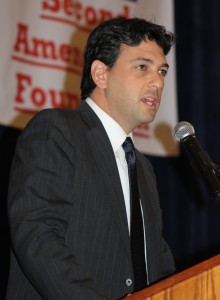By Dave Workman
Senior Editor
The District of Columbia could face a contempt citation from the federal judge presiding over the Second Amendment Foundation’s legal action pressing the city to adopt a workable concealed carry law, and it has until Dec. 4 to submit additional arguments in the proceeding.
If that happens, it would be a blow to the city’s long-running effort to be as restrictive as possible with its “may issue” carry permit approach to allowing citizens to exercise their Second Amendment rights inside the city.
While Judge Frederick J. Scullin gave the city some breathing room, the District may be running on borrowed time to comply with his July court ruling in the case of Palmer v. District of Columbia that the city craft a concealed carry regulation that passes constitutional muster. The current scheme does not appear to do that. According to the newspaper, plaintiff’s attorney Alan Gura has argued that the District so far has not “lived up” to its obligation under the July ruling.
At that time, Judge Scullin ruled that, “in light of Heller, McDonald and their progeny, there (was) no longer any basis on which this court (could) conclude that the District of Columbia’s total ban on the public carrying of ready-to-use handguns outside the home (was) constitutional under any level of scrutiny.”
Earlier in November, Judge Scullin denied a motion by the city to reconsider his July ruling. Some in the firearms community have quietly suggested that the District appears to be doing whatever it can to stall implementation of regulations that actually comply with the judge’s order.
According to the Washington Times, Gura argued that “There is no way in the world my clients can obtain a license to carry a gun.”
He also told a reporter outside the courthouse that the Second Amendment “is a right of the people. It’s not the right of a few people who the police chief selects.”
D.C. Mayor Vincent C. Gray was scheduled to have sworn in a five-member review board to consider appeals from District residents whose carry permit applications are denied. That panel includes a retired assistant U.S. attorney, a retired District Superior Court judge, the assistant deputy attorney general for the District, the retired chief of the Capitol Police and the forensic services medical director for the District’s Department of Behavioral Health.




